#@ BRYKE!!!!!
Text
Ugh I will always love the concept of Katara using blood bending to revive Zuko after the last agni kai, mostly because it makes no sense to me that Zuko was able to bounce back so easily after being struck by lightning, but also because the way the show treats bloodbending is just odd to me. It was a defense mechanism created by a traumatized victim of some of the most devastating parts of colonization, and although I understand that Hama was supposed to symbolize the "bad parts" of waterbending and was important for Katara's growth in realizing that the world isn't entirely black and white, its still disappointing to me that the show never explored the gray areas of blood bending, especially since that episode was, as I stated above, about understanding the gray areas of the war. Katara using blood bending to revive Zuko would add so much to the last agni kai in demonstrating that she has truly realized that "good" and "evil" are relative concepts, and Zuko being saved by both a defense mechanism of a survivor of colonialism and a type of bending used to terrorize his people would have even added to his arc, as the narrative required him to save and subsequently be saved by the physical embodiment of everything his family sought to annihilate.
#also just the angst potential#there are so many fics and better metas written about this but I had to throw my two cents in#Bryke's refusal to acknowledge bloodbending as anything but evil incarnate is so fucking annoying#anti bryke#bloodbending#zutara#zuko#katara#final agni kai#atla#avatar the last airbender#atla meta#zutara meta#technically
4K notes
·
View notes
Text
Katara's Story Is A Tragedy and It's Not An Accident
I was a teenaged girl when Avatar: The Last Airbender aired on Nickelodeon—the group that the show’s creators unintentionally hit while they were aiming for the younger, maler demographic. Nevermind that we’re the reason the show’s popularity caught fire and has endured for two decades; we weren’t the audience Mike and Bryan wanted. And by golly, were they going to make sure we knew it. They’ve been making sure we know it with every snide comment and addendum they’ve made to the story for the last twenty years.
For many of us girls who were raised in the nineties and aughts, Katara was a breath of fresh air—a rare opportunity in a media market saturated with boys having grand adventures to see a young woman having her own adventure and expressing the same fears and frustrations we were often made to feel.
We were told that we could be anything we wanted to be. That we were strong and smart and brimming with potential. That we were just as capable as the boys. That we were our brothers’ equals. But we were also told to wash dishes and fold laundry and tidy around the house while our brothers played outside. We were ignored when our male classmates picked teams for kickball and told to go play with the girls on the swings—the same girls we were taught to deride if we wanted to be taken seriously. We were lectured for the same immaturity that was expected of boys our age and older, and we were told to do better while also being told, “Boys will be boys.” Despite all the platitudes about equality and power, we saw our mothers straining under the weight of carrying both full-time careers and unequally divided family responsibilities. We sensed that we were being groomed for the same future.
And we saw ourselves in Katara.
Katara begins as a parentified teenaged girl: forced to take on responsibility for the daily care of people around her—including male figures who are capable of looking after themselves but are allowed to be immature enough to foist such labor onto her. She does thankless work for people who take her contributions for granted. She’s belittled by people who love her, but don’t understand her. She’s isolated from the world and denied opportunities to improve her talents. She's told what emotions she's allowed to feel and when to feel them. In essence, she was living our real-world fear: being trapped in someone else’s narrow, stultifying definition of femininity and motherhood.
Then we watched Katara go through an incredible journey of self-determination and empowerment. Katara goes from being a powerless, fearful victim to being a protector, healer, advocate, and liberator to others who can’t do those things for themselves (a much truer and more fulfilling definition of nurturing and motherhood). It’s necessary in Katara’s growth cycle that she does this for others first because that is the realm she knows. She is given increasingly significant opportunities to speak up and fight on behalf of others, and that allows her to build those advocacy muscles gradually. But she still holds back her own emotional pain because everyone that she attempts to express such things to proves they either don't want to deal with it or they only want to manipulate her feelings for their own purposes.
Katara continues to do much of the work we think of as traditionally maternal on behalf of her friends and family over the course of the story, but we do see that scale gradually shift. Sokka takes on more responsibility for managing the group’s supplies, and everyone helps around camp, but Katara continues to be the manager of everyone else’s emotions while simultaneously punching down her own. The scales finally seem to tip when Zuko joins the group. With Zuko, we see someone working alongside Katara doing the same tasks she is doing around camp for the first time. Zuko is also the only person who never expects anything of her and whose emotions she never has to manage because he’s actually more emotionally stable and mature than she is by that point. And then, Katara’s arc culminates in her finally getting the chance to fully seize her power, rewrite the story of the traumatic event that cast her into the role of parentified child, be her own protector, and freely express everything she’s kept locked away for the sake of letting everyone else feel comfortable around her. Then she fights alongside an equal partner she knows she can trust and depend on through the story's climax. And for the first time since her mother’s death, the girl who gives and gives and gives while getting nothing back watches someone sacrifice everything for her. But this time, she’s able to change the ending because her power is fully realized. The cycle was officially broken.
Katara’s character arc was catharsis at every step. If Katara could break the mold and recreate the ideas of womanhood and motherhood in her own image, so could we. We could be powerful. We could care for ourselves AND others when they need us—instead of caring for everyone all the time at our own expense. We could have balanced partnerships with give and take going both ways (“Tui and La, push and pull”), rather than the, “I give, they take,” model we were conditioned to expect. We could fight for and determine our own destiny—after all, wasn’t destiny a core theme of the story?
Yes. Destiny was the theme. But the lesson was that Katara didn’t get to determine hers.
After Katara achieves her victory and completes her arc, the narrative steps in and smacks her back down to where she started. For reasons that are never explained or justified, Katara rewards the hero by giving into his romantic advances even though he has invalidated her emotions, violated her boundaries, lashed out at her for slights against him she never committed, idealized a false idol of her then browbeat her when she deviated from his narrative, and forced her to carry his emotions and put herself in danger when he willingly fails to control himself—even though he never apologizes, never learns his lesson, and never shows any inclination to do better.
And do better he does not.
The more we dared to voice our own opinions on a character that was clearly meant to represent us, the more Mike and Bryan punished Katara for it.
Throughout the comics, Katara makes herself smaller and smaller and forfeits all rights to personal actualization and satisfaction in her relationship. She punches her feelings down when her partner neglects her and cries alone as he shows more affection and concern for literally every other girl’s feelings than hers. She becomes cowed by his outbursts and threats of violence. Instead of rising with the moon or resting in the warmth of the sun, she learns to stay in his shadow. She gives up her silly childish dreams of rebuilding her own dying culture’s traditions and advocating for other oppressed groups so that she can fulfill his wishes to rebuild his culture instead—by being his babymaker. Katara gave up everything she cared about and everything she fought to become for the whims of a man-child who never saw her as a person, only a possession.
Then, in her old age, we get to watch the fallout of his neglect—both toward her and her children who did not meet his expectations. By that point, the girl who would never turn her back on anyone who needed her was too far gone to even advocate for her own children in her own home. And even after he’s gone, Katara never dares to define herself again. She remains, for the next twenty-plus years of her life, nothing more than her husband's grieving widow. She was never recognized for her accomplishments, the battles she won, or the people she liberated. Even her own children and grandchildren have all but forgotten her. She ends her story exactly where it began: trapped in someone else’s narrow, stultifying definition of femininity and motherhood.
The story’s theme was destiny, remember? But this story’s target audience was little boys. Zuko gets to determine his own destiny as long as he works hard and earns it. Aang gets his destiny no matter what he does or doesn’t do to earn it. And Katara cannot change the destiny she was assigned by gender at birth, no matter how hard she fights for it or how many times over she earns it.
Katara is Winston Smith, and the year is 1984. It doesn’t matter how hard you fight or what you accomplish, little girl. Big Brother is too big, too strong, and too powerful. You will never escape. You will never be free. Your victories are meaningless. So stay in your place, do what you’re told, and cry quietly so your tears don’t bother people who matter.
I will never get over it. Because I am Katara. And so are my friends, sisters, daughters, and nieces. But I am not content to live in Bryke's world.
I will never turn my back on people who need me. Including me.
#ATLA#Avatar the Last Airbender#Katara#Anti Bryke#Zutara#but not really#just pro-Katara#Anti Kataang
2K notes
·
View notes
Text
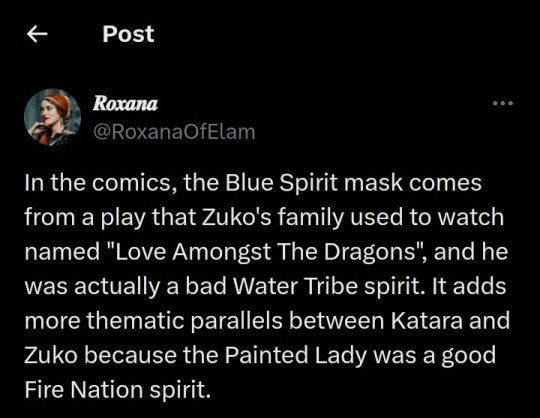
Zutara are parallels in every possible ways, yet they didn't end up together, and other shipper expect me to not upset about it?
2K notes
·
View notes
Text

so what and who do we have to sacrifice to see this concept happen….
#atla#avatar the last airbender#kataang#maiko#katara#mai#maitara#i just this is neat and the greatest thing ever#@ BRYKE!!!!!
2K notes
·
View notes
Text
the anti-Zutara criticism that “Zutara shippers are teenage girls who only like the ship because they self-insert as Katara” is actually so funny because how does that delegitimize the ship? So…girls who relate to Katara like Zuko, and they think Katara would like Zuko, and that’s bad because…girls are wrong? Girls are shallow? Girls don’t know what’s good for them?
Anyway if I were a grown ass man who created a fictional teenage girl that lots of real teenage girls relate to, and these girls believe she would like character B instead of character A, I hope I’d have the humility to say to myself “hmm I wonder why people who relate to this character’s feelings and motivations think she would react this way” instead of jumping straight to “these girls are doomed to like toxic relationships”
(And I know Zutara shippers like the ship for many different reasons, and self-insert is not the most popular by a long shot, I’m just saying that the criticism of self-insert stems from dismissal of what teenage girls like, and that feels kinda misogynistic to me)
#Zutara#pro Zutara#anti bryke#katara#Anti kataang#not really anti kataang but tagging it just in case#I should tag this “pro teenage girls”#My meta
1K notes
·
View notes
Text
bryke: “people only shipped zutara because it was dark and intriguing”
me:
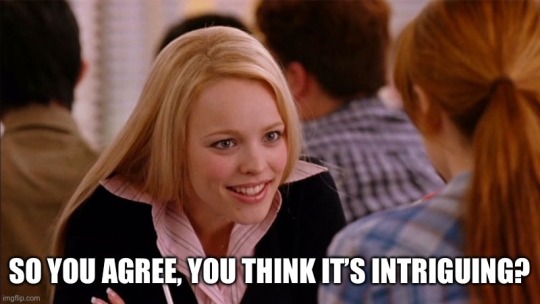
#zutara#i am NOT putting this in the main tags lmao#polls found i do have an ounce of self preservation#anyway. many of talked about why they disagree with the assessment of zutara as a ‘dark’ shipa#and also how moralizing shipping in general is Strange#but also. why is intriguing being used as an insult here. curious minds want to know.#(it’s me i’m curious minds)#bryke critical
541 notes
·
View notes
Text
When people try to justify Katara in TLOK by saying she's old I want to pull my hair out ! In this case, why is this not the case for other former members of the gaang who are active despite their old age ? Why does Katara have 0 statues in the town ? Why out of everything she could do, she's just kept as a great healer when that's not what she wanted in the original ? Why, if she is such a great healer, does she almost never manage to heal anyone ? Why does she never go anywhere unlike other gaang members who are so old ? Like the bloodbending trial ?! Since it was she who banned it (a very stupid thing, by the way). Like, his granddaughter's own ceremony ? Why isn't she there but Zuko is ?! How come Katara doesn't see her family often ?! She doesn't even try to see them ?! We're talking about Katara ! She would never do that ! Why do we learn more about Aang's role than Katara's about parent-child relationships ?! Stop trying to defend Katara's crappy writing from old age. Old age doesn't stop you from doing badass things in the Atla universe. Everyone forgot Bumi ?! I am so angry ! The simple truth is that Bryke, as in the comics, specifically erased Katara to reduce her to Aang's wife. That's all. Why am I making this rant ? Because I'm tired, once again, of seeing people defend Katara's writing in TLOK under the pretext that she's old, and especially seeing people say that the writing of strong women is even better in TLOK. Can we just talk about the horrible treatment of Korra herself in this ?! Not forgetting the worst thing I have ever seen ! To say that the treatment of Katara in TLOK is better than in the netlfix remake of Atla... How angry all this can make me !
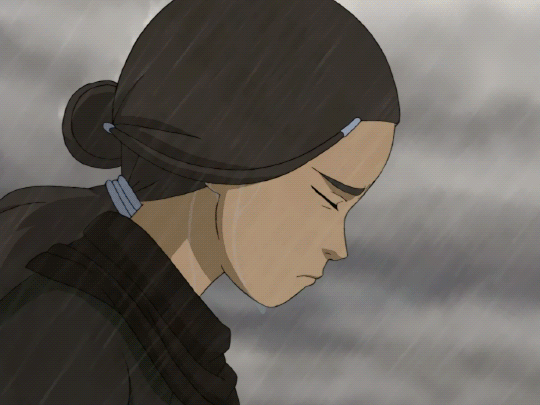
#zutara#pro zutara#katara#pro katara#katara atla#atla katara#zuko#pro zuko#prince zuko#pro prince zuko#fire lord zuko#pro fire lord zuko#zuko atla#atla zuko#anti tlok#anti the legend of korra#anti katara tlok#anti tlok katara#anti bryke#atla#avatar the last airbender#avatar : the last airbender#anti kataang
562 notes
·
View notes
Text
Excuse my Zutara fangirlism but I’m on my hundredth ATLA rewatch and I just noticed another one of those scenes that could have made for PERFECT foreshadowing… it’s really crazy how this ship wrote itself in the show!
Anyways notice how Katara reacts to Jet seemingly wanting to join the gaang and Toph calling her out on it:
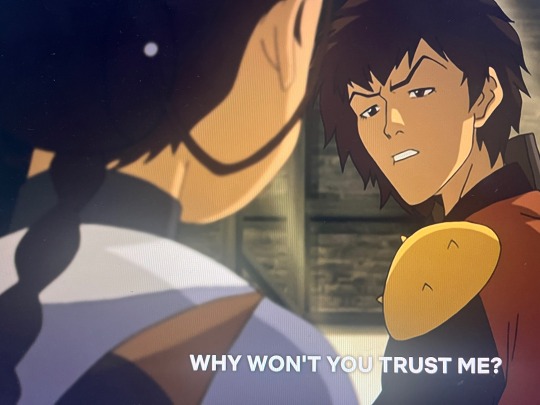

(Excuse the bad quality Netflix didn’t allow me to take screenshots bahah)
And then:
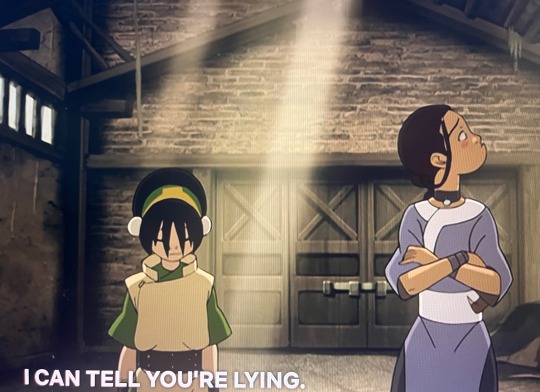
She’s blushing because she obviously had feelings for Jet, a canonical love interest of hers.
But doesn’t this scene strike you as familiar in any way…..?
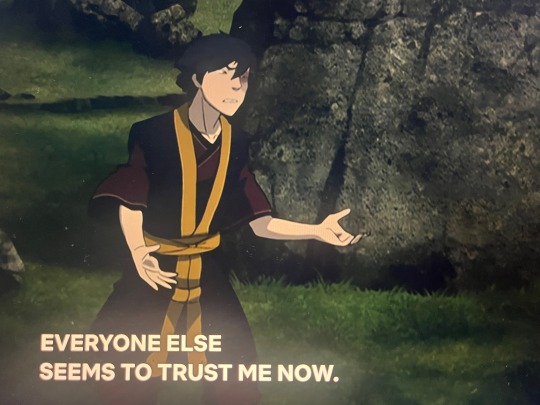

She reacted the same way with Zuko, these scenes are so identical it’s INSANE! The subtext!! *screams*

But this time Zuko is genuine and works to gain her trust back!! And then we see him risk his life for her like a couple episodes later…. AHHHHH
How are they not a canon couple again??
#zutara#Zuko x Katara#Prince Zuko#Zuko atla#Katara#katara of the southern water tribe#jet atla#zutara analysis#this ship has me in its shackles like please release me!#atla#avatar the last airbender#netflix avatar#avatar live action#natla#rambles#also the fact Jet and Zuko have similar vibes… Katara I know you was crushing baddd#Bryke tried to silence you but I know the truth#jet
625 notes
·
View notes
Text
Katara's other canon love interests give her agency, and her pov.
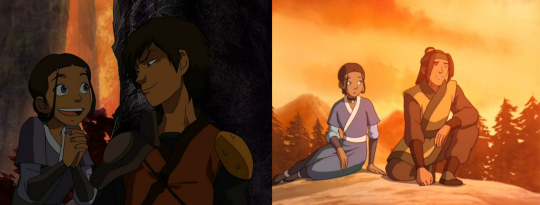
And gets a moment where the two connect over similar losses.

Except Aang.
Kataang is framed entirely from Aang's point of view.

Even when he violates her boundries.
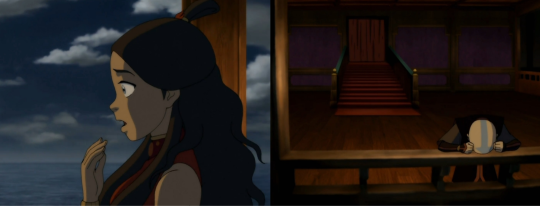
And is unable to handle Katara's grief.

But Zutara?
We get Katara's pov, and give her agency.

He saw her at her very worst, and wasn't at all hostile.

And Katara opened up to Zuko in the most significant way.
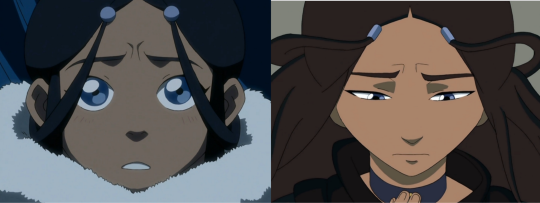
#How are they not canon#katara didn't even forgive Zuko while opening up to her#Aang had 3 books#and yet she opens up to Zuko#not her canonical love intetest#oh my god#zutara#zutara meta#anti kataang#aang critical#anti aang#anti anti zutara#kataang critical#the southern raiders#atla critical#anti bryke#bryke critical#avatar critical#pro zutara#pro zuko#zutara analysis#zutara was robbed#zutara forever#zutara evidence#katara of the southern water tribe#katara#zuko#zuko x katara#kataraxzuko#atla katara
2K notes
·
View notes
Text
wait one more thing about Ember Island Players that's so funny is like... imagine creating a show and then becoming either frustrated/annoyed/bemused that a sizable part of your fandom ships two characters that you don't want them to. And instead of ignoring it or letting it lie, they decide to use this episode as a moment to show these fans how silly that ship is. And sure, maybe its all supposed to be in good fun but like if the goal, in-part, was to discourage people shipping them, I cannot emphasize enough how acknowledging the pairing in-universe, having people consistently mistake them for a couple, and having said characters constantly over-react to the very notion and get belligerently defensive because they are very much not dating why would you say that is extremely antithetical to that goal.
#as if those aren't common tropes that shippers love.#lmao its comedy#atla#zutara#like having zuko and katara get SO defensive when June thinks that they're dating (again) ... its not doing what bryke thinks it is#especially when you contrast katara's reaction when Toph thought she had a fling with Haru which was like an apathetic/confused no
785 notes
·
View notes
Text
is anyone going to tell the kat@angers that it's not feminist activism to argue Katara's arc in LOK is fine on the grounds that "some women want to be homemakers and that's okay!!"
Like you're not helping real women that way. In fact, most antis for the cannon ship ARE women. Many are homemakers themselves.
Katara is not a real woman. She is a fictional woman written by men.
Can the sensibilities and wishes of a girl change by the time she is a adult? Yes!
But as this is a textual character who, as per the text, rejects the societal structure of her fictional world (which mirrors our own) that women are and can only ever be docile homemakers (i.e. I don't want to heal, I want to fight; I will never turn my back on people who need me; let's start a prison riot; let's engage in vigilante ecoterrorism; let's pitch an absolute fit because the boys are not pulling their fair weight in the homemaking; let's confront my mother's killer at the absolute rejection and condemnation of the male figures whom I am to respect; etc) it is perfectly reasonable to argue that this end was not a natural course for her character.
Fictional characters are not real people. This means that they do not change their mind off screen. That is not an acceptable argument. That is called a "plot hole", which is a nonsensical change made at the convenience and contrivance of the writer(s), who in this case are men exhibited to not care for women or girls all that much. It is within THEIR character to write this way.
Regardless of who, if anyone, Katara ended up with, Katara tolerating disrespect, neglect, abuse of her children, giving up all of her former aspirations to live in the shadow of men, and dying as a mere footnote in history (and being alright with it!!) is not surprising given the absolute vitriol Bryke has shown toward female fans of their "creation". It was supposed to be a "boy" show. It was always supposed to be a "boy" show. The creators of Supernatural and Game of Thrones did the same thing. ATLA just did it first.
Arguing "not all women" is not activism in the face of what is really happening in this discourse. Sending death threats to real, actual women with feelings in defense of a fake pretend woman's fake pretend autonomy is performative activism, and worse, hypocritical.
Not all women agree with you. Not all women feel represented and find the outcome of Katara's story satisfactory. If y'all care about feminism and respecting women's choices so much, lay off the real life women you're so fond of harassing. Our views and opinions, while opposing your own, don't affect you.
#i know we've all told them but yall im tired#antikataang#anti kataang#its tagged but the people who this is targeted for will see it#folks perusing the zutara tag for hate purposes#yall are weird#guess who has never set foot in the kata@ng tag#its me <3#zutara#antibryke#anti bryke#bryke critical
439 notes
·
View notes
Text
Me, screaming into the void: I DON'T HATE MAI I JUST FEEL LIKE SHE NEEDED MORE DEVELOPMENT OUTSIDE OF ZUKO AND HER ARC SHOULDN'T REVOLVE AROUND HER LOVE INTEREST
Also me, still screaming into the void: I DON'T HATE AANG I JUST QUESTION WHETHER HIS ROMANTIC INTEREST IN KATARA BRINGS OUT THE BEST SIDES OF HIM AND FEEL AS THOUGH HE AND HIS DEVELOPMENT IS NOT ABOVE NECESSARY CRITICISM
#why do antis think I hate either of them the moment I question their development and the writing choices bryke made for them#they're good characters I just want them to live up to their full potential#a lot of their actions in season 3 especially revolving around romance were counter intuitive to their arcs made them come off as jerks#it got to the point of character assassination istg#anti maiko#anti kataang#mai#aang#criticism is not hate#aang critical#anti bryke#this doesn't have anything to do with zutara but tagging for exposure#zutara
598 notes
·
View notes
Text
It’s really funny how much people misremember certain aspects of ATLA and then proclaim to the internet stuff that either never happened or is extremely distorted with absolute certainty. For example, today I saw a person claiming that whole point of Katara’s character arc was unlearning the parentified behaviours she developed in wake of her mother’s death. That a huge part of Katara’s arc was a confrontation of how that trauma fundamentally shaped her maternal tendencies.
The thing is though…WE the audience, can recognize that the parentification Katara experienced was something that was really straining for her, but the TEXT doesn’t. The audience (or at least certain parts of the audience) can identify that her maternal tendencies were indicative of a responsibility that she took on far too young and subjected her to unnecessary pressure and stress. There are flashes of recognition maybe, but for the most part, the show doesn’t actually confront the negative impact that Katara’s maternal role had on her.
Katara never truly unlearns the maternal behaviours that put so much pressure on her because the text doesn’t see it as a bad thing. Arguably, the text doesn’t see much of a problem with the emotional labour Katara takes on and how that labour goes unreciprocated for the most part (particularly from her canon love interest). We see some reflections, but it’s not enough to support a reading of the text where that element is actually extremely obvious and a prominent point in her character arc.
We’re not the ones “watching the show with our eyes closed”, I think you’re just misremembering the canon progression of Katara’s arc to avoid confronting a real issue in the text.
#Katara#pro katara#avatar the last airbender#atla fandom critical#atla discourse#the gaang#character analysis#atla fandom discourse#zutara#atla critical#anti bryke
433 notes
·
View notes
Text
seeing people say they knew all along the live action would be bad after seeing the news about them toning down sokka’s misogyny bc “the original creators never would’ve let this happen! that’s why they left!”… ohhh my god. oh my god. the original creators made the legend of korra. the original creators had story direction on most of the post-atla comics. the original creators were involved with the goddamn m. night shyamalan film for fuck’s sake & spoke positively about it (at least, right up until it bombed upon release and then… *crickets*.) they cannot be trusted on jack, and i for one am immensely glad they are staying far, far away from the project.
regardless of whether the live action succeeds or not, bryke were never going to singlehandedly make it a cinematic masterpiece so please get that out of your heads and start judging the live action on its own merit — not by the inclusion (or lack thereof) of two men who have proven over and over again that they know fuck all about what truly made their show great.
#besides if recent adaptations have taught me anything#it’s that sometimes… creators being involved with adaptations is Bad Actually#anti bryke#anti lok#anti atla comics#atla live action
432 notes
·
View notes
Text
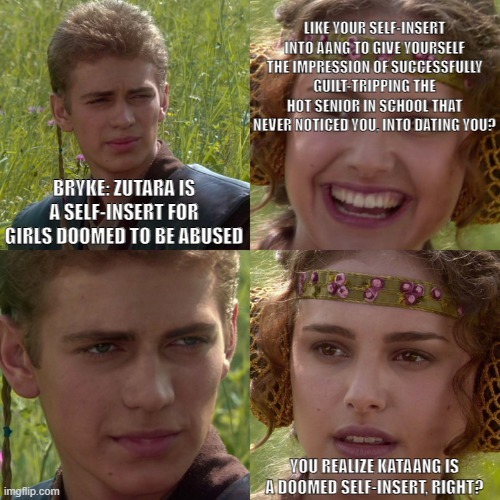
¯\_(ツ)_/¯
#anti bryke#I honestly wouldn't have a problem with this if they didn't treat their fans like shit#but they do treat them like shit so here we are#zutara#still salty
353 notes
·
View notes
Text
Zutara, romance novels, and the female gaze
Okay so I’ve been thinking about the female gaze a LOT so I checked out a subreddit about romance novels, despite never having read one. I came across this meme (which was initially a Tumblr post and then got posted to Instagram and then to Reddit and I’m now bringing back to Tumblr — Internet telephone, pls never change):
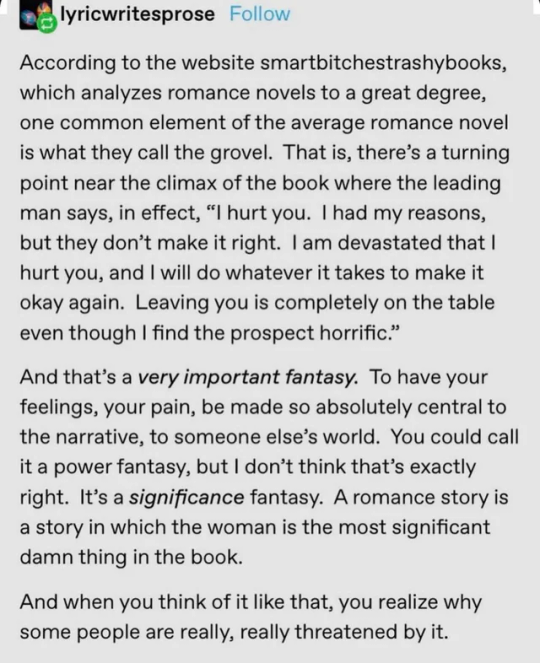
And…what is The Southern Raiders, if not a platonic grovel? Katara’s pain is central to the episode. It’s central to Zuko. Zuko asks Katara what he can do to make up for his betrayal; she demands the impossible. He reads between the lines, cockblocks her brother to get the necessary information, and then waits outside her door overnight (which he also did for Iroh, the one person we know for sure he loves). He basically makes himself a receptacle for her rage, and he holds space for her by coming with her on her revenge quest and carrying their bags and not saying a damn thing about what she should and should not do beyond like…asking her to rest. And obviously the grovel works! She forgives him and then they’re thick as thieves, bantering and fighting and saving each other’s lives, etc.
On a different note, I’ve been told that enemies to lovers is one of the biggest tropes in romance novels, similar to YA lit and fanfic. Here’s something else I found in the romance novel discourse:
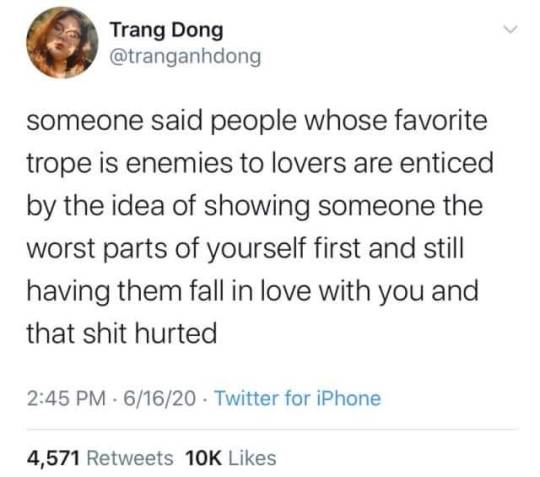
And…yeah. In TSR, Katara really does show Zuko her worst self, because she doesn’t feel the need to perform for him. She doesn’t feel the need to perform moral perfection OR cold blooded vengeance. She bloodbends in front of him and he just goes with it. She doesn’t kill Yon Rha and he just goes with it. He doesn’t treat her any differently afterwards. Maybe they talk about it off screen, but I kind of like the idea that they don’t, because Katara doesn’t need to explain anything.
And it’s so interesting, because some people in the ATLA fandom have a totally different read on TSR. They think Zuko was encouraging Katara to get revenge (by what, keeping his mouth shut?), and that Aang is the one who acts as her moral compass. I believe that either Bryan or Mike said in the DVD commentary that Aang is the angel on her shoulder the entire time. And this interpretation does make sense if you see it from the male gaze, where Katara as an object of affection is acting in an angry, irrational, threatening way. But if you see it from the female gaze, you recognize that actually it’s probably the most emotionally taxing experience Katara has to go through, and she doesn’t owe it to be nice or perfect to anybody. Katara’s formative trauma literally comes to a head, and she has to make a decision — no, a discovery — about who she is in relation to the tragedy that defines her life and even her identity (as a waterbender, as a parentified child who becomes the mom friend, as a genocide victim), and she’s accompanied by someone who trusts her judgement and validates her feelings.
I’m not saying TSR is explicitly romantically coded, but when it conforms so well to romance novel tropes…is it any wonder that so many people thought “yes this is her man?” And then he takes lightning in the heart for her and reaches for her when he’s literally dying, I will never be normal about that either
#Zutara#Katara#Zuko#the southern raiders#Pro zutara#anti Bryke#I guess#I swear I’m not a Bryke anti but I feel like they just don’t get#The female gaze#and the fact that Zutara is so female gaze is kind of an accident and I find that fascinating#atla fandom critical#The southern raiders turned me into a Zutara shipper#one ep away from the finale#Zutara meta#My meta
1K notes
·
View notes